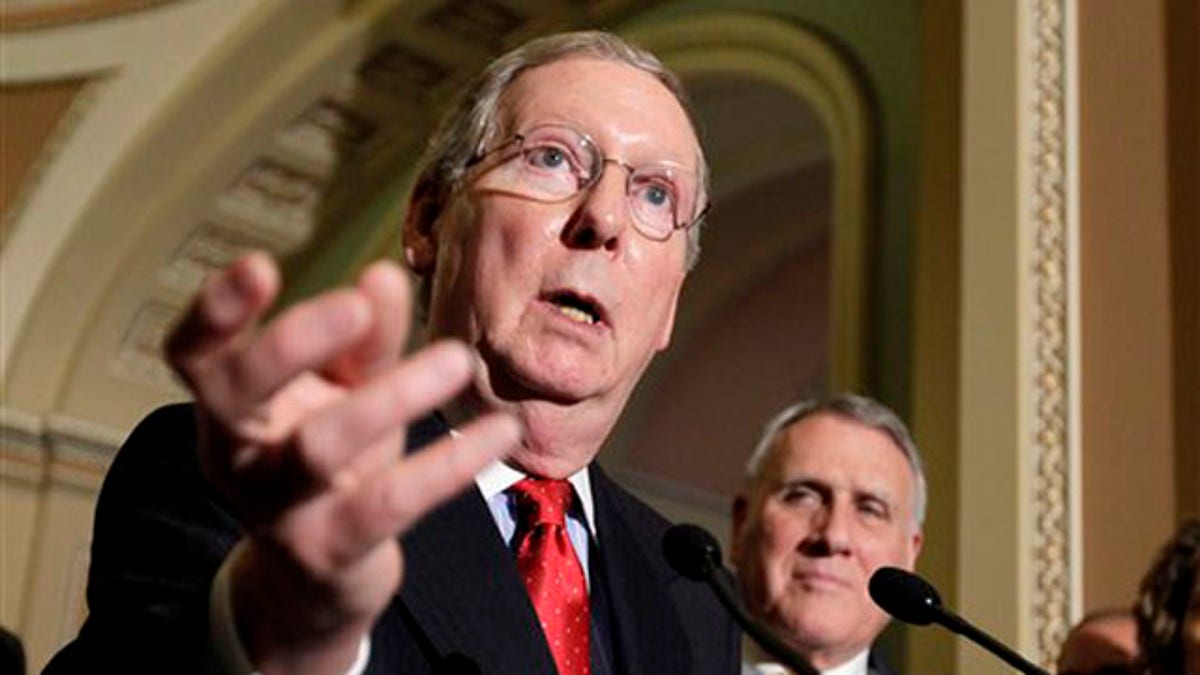
Senate Republican Leader Mitch McConnell gestures while speaking with reporters following a weekly Republican policy luncheon June 28 on Capitol Hill. (AP)
Senate Republican Leader Mitch McConnell told Fox News that he thinks a major deficit-reduction deal cutting $4 trillion over the next decade is off the table, claiming Democrats are pushing too hard for tax increases.
"Everything they've told me and the speaker is that to get a big package would require big tax increases in the middle of the economic situation," McConnell told "Fox News Sunday." He called the prospect of tax hikes a "terrible idea."
The Senate GOP leader is the latest to weigh in on the roller-coaster negotiations that are set to continue Sunday evening at the White House. That summit is taking on fresh urgency after House Speaker John Boehner announced he was lowering expectations about the size of the deficit-reduction package that can be achieved over concerns about the rift between the two parties.
Boehner announced Saturday that he wants to focus on a package more in line with what was being discussed in earlier negotiations led by Vice President Biden. Those talks centered on about $2 trillion in deficit reduction over the next decade. The White House in recent days had raised the bar to about $4 trillion, but Boehner dialed things back following a conversation with President Obama Saturday evening. McConnell backed Boehner on Sunday.
According to Boehner's office, the White House was continuing to push too hard for tax hikes and was starting to backpedal on the call for entitlement reform after hearing complaints from congressional Democrats.
"Despite good-faith efforts to find common ground, the White House will not pursue a bigger debt reduction agreement without tax hikes," Boehner said. "I believe the best approach may be to focus on producing a smaller measure, based on the cuts identified in the Biden-led negotiations, that still meets our call for spending reforms and cuts greater than the amount of any debt limit increase."
McConnell said Sunday he still wants "the biggest deal possible," but downplayed the prospects for a $4 trillion deal, as well as tax reform, as part of the current negotiations.
The statements were a change in tone from comments following Thursday's deficit talks in Washington, when Republicans and the White House seemed to be edging closer to each other -- in turn angering Democrats.
White House Chief of Staff Bill Daley, speaking on ABC's "This Week," said the president is still committed to pushing for a big package at the Sunday evening meeting.
"Everyone agrees that a number around $4 trillion is the number that will make a serious dent on our deficit," Daley said. "That's what he wants to see. ... This president's still committed to doing big things."
Daley called Boehner's statement "unfortunate."
A deficit reduction agreement is crucial to winning Republican support for an increase in the nation's borrowing limit. The government's borrowing capacity is currently capped at $14.3 trillion and administration officials say the United States will go into default without action by Aug. 2.
White House communications director Dan Pfeiffer also said Obama intended to continue to push for as big a deficit reduction number as possible and that tax revenue be part of the mix.
"The president believes that solving our fiscal problems is an economic imperative. But in order to do that, we cannot ask the middle-class and seniors to bear all the burden of higher costs and budget cuts," Pfeiffer said. "We need a balanced approach that asks the very wealthiest and special interests to pay their fair share as well, and we believe the American people agree."
Pfeiffer said: "Both parties have made real progress thus far, and to back off now will not only fail to solve our fiscal challenge, it will confirm the cynicism people have about politics in Washington."
A Republican official familiar with the discussions said taxes and the major health and retirement entitlement programs continued to be sticking points.
Obama wanted Republicans to accept closing some corporate tax loopholes and subsidies to corporations, ending a tax-friendly inventory accounting system for businesses, as well as reducing the value of tax deductions for wealthy taxpayers.
A senior administration official said the discussion on taxes broke down over the administration's desire to have the wealthy pick up a bigger share of the tax revenue load than Republicans were willing to accept.
The official, speaking on the condition of anonymity because of the sensitivity of the negotiations, said the $2 trillion to $2.4 trillion in deficit reduction identified by the Biden-led negotiations remains under negotiation and will also require some new tax revenue of up to $400 billion.
The Associated Press contributed to this report.




